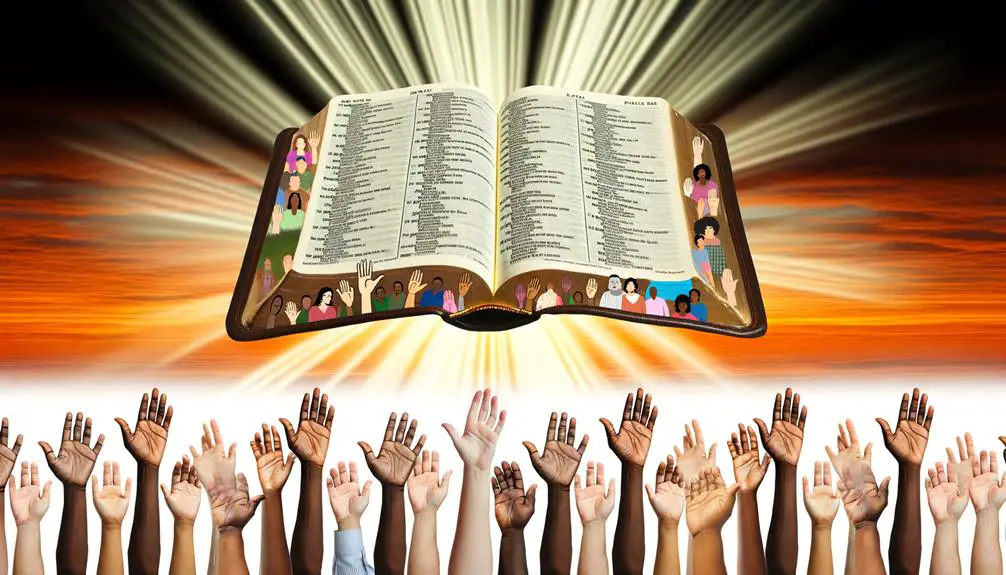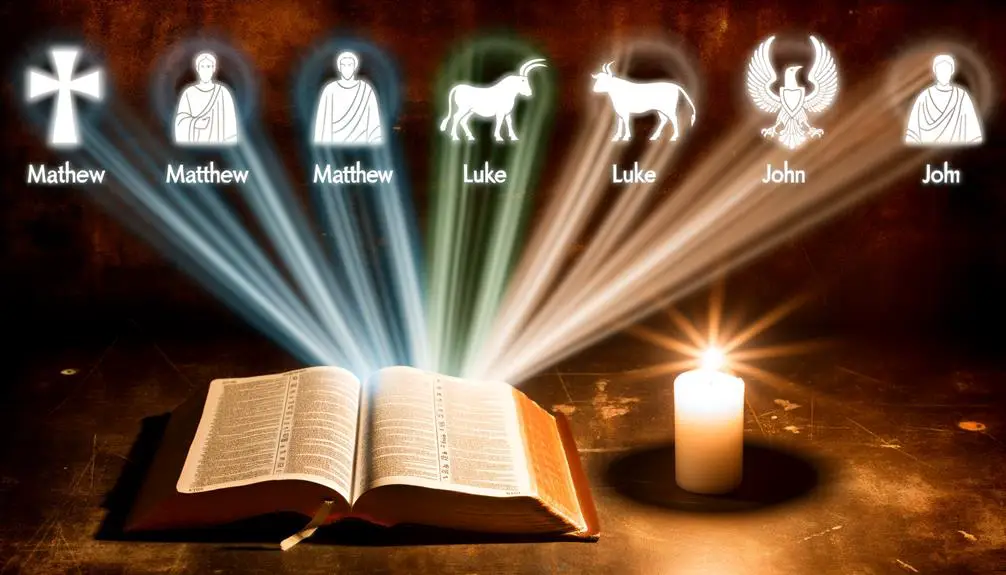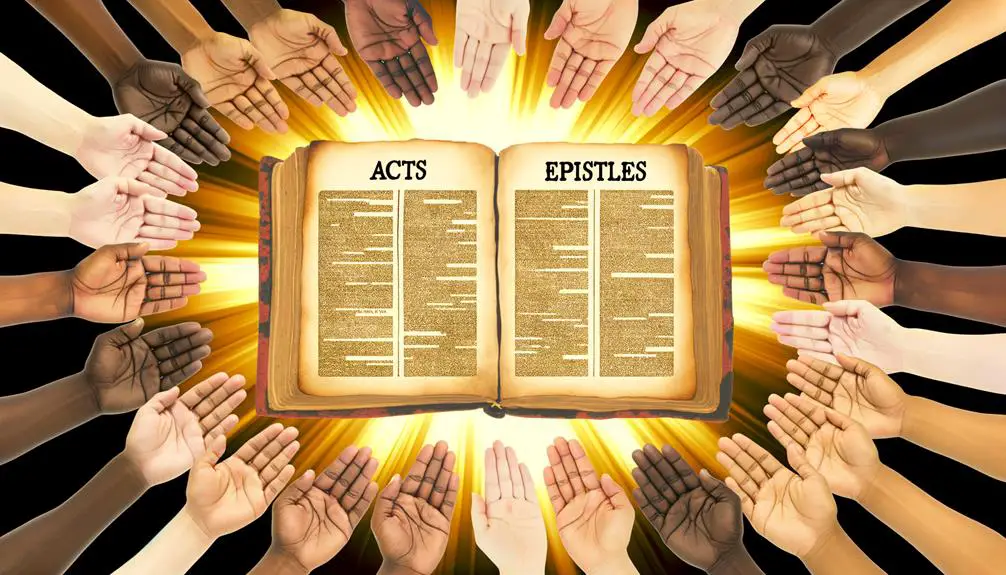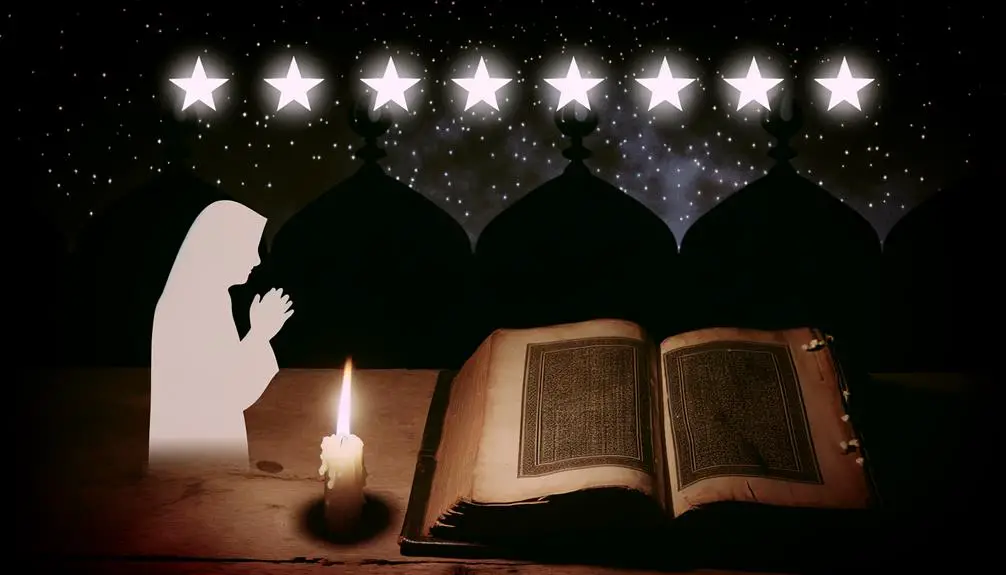From Abraham's intercession to Jesus' pleas, explore the depth of 650 biblical prayers and uncover the heart of divine communication.

List of 650 Prayers in the Bible
You might think the Bible has cornered the market on prayers, with a whopping 650 entries—it's practically the Amazon of spiritual dialogues.
As you explore this diverse collection, from the heartfelt pleas of patriarchs to the profound petitions in the Psalms and the fervent supplications of the New Testament figures, you'll uncover a rich tapestry of faith, hope, and spiritual resilience.
But don't stop at marveling at the sheer number; each prayer offers a unique insight into the human condition and divine interaction. So, what hidden gems will you find in this vast spiritual anthology?
Key Takeaways
- The Bible features prayers across various contexts, including personal supplication, divine promises, and pivotal moments of divine-human communication.
- Prayers in the Bible reflect a blend of personal piety, political strategy, and the quest for understanding life's complexities.
- Biblical prayers showcase the multifaceted roles of figures like Patriarchs, Kings, and Prophets, and their interactions with the divine.
- The collection includes prayers from foundational narratives, wisdom literature, gospel accounts, and apocalyptic revelations, demonstrating prayer's integral role in spiritual life.
Prayers of the Patriarchs

The prayers of the patriarchs in the Bible, including figures such as Abraham, Isaac, and Jacob, represent foundational moments of communication with God, marked by deep faith and profound spiritual insight. These patriarchal prayers aren't mere utterances but are deeply embedded in the narrative structure of the Bible, showcasing a unique blend of personal supplication, divine promises, and the establishment of covenants. You'll notice that these moments are often accompanied by significant events such as patriarchal dreams and covenant ceremonies, each serving as a pivotal point in the unfolding biblical narrative.
Patriarchal dreams, for instance, aren't just mere nighttime visions but are laden with divine messages, often requiring interpretation and leading to a form of prayer or action in response. These dreams serve as a conduit for divine communication, guiding the patriarchs in their decisions and reinforcing their faith. The dreams of Jacob, for example, not only reveal future promises but also reinforce his role within the covenantal relationship established by God.
Covenant ceremonies, on the other hand, are tangible moments wherein the patriarchs enter into a formal agreement with God. These ceremonies are preceded or followed by prayers that underscore the patriarchs' commitment to God and their reliance on His promises. The ceremony involving Abraham (then Abram) in Genesis 15 is a prime example, where a profound encounter with God through a vision leads to a covenant that shapes the destiny of a nation.
In analyzing these elements, it's clear that patriarchal prayers, dreams, and covenant ceremonies are intricately woven into the fabric of biblical theology, demonstrating a profound relationship between humanity and the divine. These narratives not only highlight the patriarchs' unwavering faith but also set a precedent for understanding the power and significance of prayer in the biblical context.
Kings and Prophets' Supplications

You'll find that the supplications of kings and prophets in the Bible reveal a complex interplay between divine will and human agency. Analyzing prophetic requests offers insights into how prophets viewed their relationship with God, highlighting a unique blend of humility and authority.
Similarly, examining the prayer dynamics of kings uncovers how they sought divine guidance in governance, often reflecting their personal faith and the political context of their times.
Prophetic Requests Analyzed
Throughout biblical narratives, numerous kings and prophets have voiced supplications that not only reflect their personal desires but also serve as divine communications, meriting a detailed and scholarly analysis. These prayers, deeply embedded in historical context, carry immense cultural significance, offering insights into the spiritual life and priorities of the era's most influential figures.
Prophet/King |
Historical Context |
Cultural Significance |
|---|---|---|
Elijah |
Drought in Israel |
Faith in crisis |
Isaiah |
Assyrian threat |
National survival |
Jeremiah |
Fall of Jerusalem |
Grief and hope |
David |
Reign and warfare |
Leadership and faith |
Each instance encapsulates a moment where personal devotion and public duty intersect, inviting a deeper understanding of the nuanced relationship between divine will and human agency in biblical times.
Kings' Prayer Dynamics
Delving into the dynamics of kings' prayers reveals a complex interplay between personal piety and political strategy, shaping the biblical narrative in profound ways.
The expressions of royal humility before the divine reflect not just a personal submission but also a crucial leadership strategy. When kings lay bare their vulnerabilities, seeking leadership blessings, they're not merely engaging in a religious act; they're also strategically positioning themselves as humble servants of a higher power, thus legitimizing their rule in the eyes of their subjects.
This dual approach underscores the multifaceted role of prayer within the socio-political context of biblical times, illustrating how spiritual supplication served as both a personal conduit for divine favor and a public tool for political maneuvering.
Wisdom Literature Prayers

Within the Wisdom Literature of the Bible, prayers often embody a quest for understanding and navigating the complexities of life. This quest is vividly represented in Solomon's plea for wisdom, where he acknowledges his limitations and seeks divine insight to govern his people. Similarly, Job's lamentations reflect a profound struggle with suffering and the pursuit of meaning amidst adversity. These expressions of faith highlight a deeper yearning for comprehension and guidance in a world fraught with moral and existential dilemmas.
Text |
Key Themes |
|---|---|
Solomon's Prayer for Wisdom (1 Kings 3:5-14) |
Solomon's humility and his desire for discernment rather than material wealth underscore a pivotal moment where human inadequacy meets divine provision. |
Job's Lamentations (Job 3:1-26) |
Job's raw emotional outpouring challenges the notion of retributive justice, prompting readers to wrestle with the reality of unexplained suffering. |
Proverbs' Prayers for Guidance (Proverbs 2:1-8) |
The pursuit of wisdom is framed as a moral imperative, advocating for a life aligned with divine principles to navigate ethical complexities. |
Ecclesiastes' Reflections on Mortality (Ecclesiastes 3:1-8) |
A meditative acknowledgment of life's fleeting nature, urging a wise stewardship of time and an embrace of the divine rhythm governing existence. |
The Wisdom of Sirach's Counsel (Sirach 1:1-20) |
Advocates for a reverential fear of the Lord as the foundation of wisdom, blending practical advice with spiritual insight to cultivate a righteous life. |
Analyzing these prayers within the Wisdom Literature reveals a tapestry of human vulnerability, divine interaction, and the unending quest for understanding that transcends time and culture.
Psalms of Petition and Praise

Numerous Psalms of Petition and Praise intricately weave together the human experiences of despair and worship, offering profound insights into the dynamics of faith in the face of adversity. These psalms serve as a testament to the enduring nature of faith, even when confronted with the most daunting of life's challenges. They embody a remarkable emotional resonance that speaks to the very core of the human condition, reflecting a wide range of emotions from the deepest despair to the highest exaltation.
The musical influences evident in these psalms further amplify their emotional impact. The rhythm and cadence of the verses contribute to a heightened sense of engagement, drawing you deeper into the psalmists' experiences. This musicality isn't merely ornamental; it plays a pivotal role in conveying the intensity of the emotional states being expressed. The use of repetition, for instance, serves to underscore the earnestness of the petition or the fervency of the praise, enabling you to not just read, but feel the desperation or joy woven into each line.
Moreover, the Psalms of Petition and Praise stand out for their detailed portrayal of the relationship between the individual and the divine. They don't shy away from expressing doubt, fear, or frustration, yet they always circle back to a place of trust and adoration. This honesty in expressing vulnerability before God enhances their relatability, making them a source of comfort and inspiration for generations.
Prayers From the Gospels

In the Gospels, you'll find that each recorded prayer offers a unique lens through which to view the intimate communications between Jesus and His Father, shedding light on the spiritual depth and theological significance of these dialogues. These prayers range from miracle requests to healing petitions, each encapsulating a moment of divine interaction that reveals the nature of Jesus' ministry and His relationship with God.
The Gospels document numerous instances where prayer serves as the pivotal channel for divine action. Miracle requests, for instance, are not merely appeals for the supernatural but are deeply rooted in faith and the desire to manifest God's kingdom on Earth. Healing petitions, on the other hand, showcase Jesus' compassion and His power to restore, both physically and spiritually.
Consider the following table that captures a glimpse of these prayerful interactions:
Gospel |
Type of Prayer |
Significance |
|---|---|---|
Matthew |
Miracle Request |
Demonstrates Jesus' authority over nature and His willingness to respond to faith. |
Mark |
Healing Petition |
Highlights Jesus' compassion and the integral link between faith and healing. |
Luke |
Prayer of Thanksgiving |
Reveals Jesus' humility and His constant communion with the Father. |
Analyzing these prayers, you'll notice that they're not just requests but are acts of faith, expressions of deep theological truths, and manifestations of Jesus' mission. They offer a model for your own prayers, encouraging a faith that is active, a compassion that seeks to heal, and a life that constantly seeks God's presence and guidance.
Acts and Epistles Intercessions

Transitioning to the Acts and the Epistles, you'll discover that intercessions play a pivotal role, showcasing the early church's reliance on prayer as both a personal and communal act of faith. This era of biblical narrative is rich with instances where prayer not only underscores the believers' dependence on divine guidance but also serves as a means to bolster the community's unity and resolve amidst persecution and trials.
Delving into the Acts, you'll observe the apostles' continuous engagement in prayer, particularly during significant moments that shaped the early church's trajectory. These prayers, often communal, reflect a deep sense of collective faith and an unwavering belief in the power of God's intervention in their endeavors. The narrative vividly illustrates how prayer facilitated the selection of leaders, the commissioning of missionaries, and the outpouring of the Holy Spirit, thereby reinforcing the church's foundational structures.
Transitioning to the Epistles, Paul's earnestness in prayer becomes unmistakably evident. His letters are interspersed with Epistolary blessings and intercessions, not merely as formalities but as genuine expressions of his hope and concern for the recipients' spiritual welfare. Paul's prayers, often infused with theological insights, reveal his deep yearning for the believers' growth in faith, love, and knowledge of God. These intercessions serve not only as petitions for divine favor but also as vehicles for teaching, encouraging, and spiritually nurturing the early Christian communities.
Through these acts and epistles, the Bible presents a compelling narrative on the centrality of prayer, demonstrating its integral role in the life and mission of the early church.
Revelations and Final Pleas

As you explore the subtopic of 'Revelations and Final Pleas', you'll uncover the intricate ways in which divine messages are deciphered and humanity's ultimate requests are articulated in the Bible.
This section scrutinizes the profound dialogues between the divine and humankind, highlighting the critical moments where revelations serve as pivotal points for spiritual insight and transformation.
Through a detailed examination, you'll grasp how these final pleas encapsulate the essence of human longing and divine response, offering a rich tapestry of faith, hope, and redemption.
Divine Messages Deciphered
Throughout biblical narratives, divine messages and final pleas often serve as pivotal moments, guiding characters and readers alike towards profound insights and resolutions. These narratives underscore the complex dynamics of prayer effectiveness and spiritual communication.
By deciphering divine messages, individuals in the Bible engage in a deep, transformative dialogue with the divine, marking a critical juncture in their spiritual journey. This process reveals a nuanced understanding of how earnest seeking and receptivity to divine will can lead to significant revelations.
The act of interpreting these divine communications further illustrates the intricate relationship between human agency and divine guidance. It's a testament to the power of spiritual communication in shaping one's destiny and understanding of the divine.
Humanity's Ultimate Requests
In the biblical context, humanity's ultimate requests, encompassing revelations and final pleas, often emerge at the crossroads of desperation and divine intervention, illustrating a profound dependency on spiritual guidance for existential resolution. Your journey through these passages isn't just an exploration of ancient texts; it's a mirror reflecting modern spirituality's evolution, shaped by cultural influences.
Aspect |
Influence on Prayer |
Modern Reflection |
|---|---|---|
Desperation |
Calls for Divine Intervention |
Crisis-driven spirituality |
Divine Intervention |
Assurance and Guidance |
Search for meaning |
Revelations |
Understanding God's Will |
Personal enlightenment |
Final Pleas |
Ultimate Surrender |
Letting go of control |
This table distills the essence of humanity's ultimate requests into a framework that not only navigates through biblical narratives but also offers insights into how these age-old invocations influence and are reshaped by contemporary spiritual practices.
Frequently Asked Questions
How Can Understanding the Context of These Biblical Prayers Enhance One's Personal Prayer Life or Spiritual Journey?
Understanding the context behind biblical prayers can deeply enrich your spiritual journey. It's not just about reciting words; it's about grasping the prayer psychology and spiritual dynamics at play.
You'll see how emotions, circumstances, and faith interconnect, offering a more profound, scholarly insight into your own prayers. This detailed analysis helps tailor your spiritual practice to be more meaningful, making your personal prayer life resonate with the depth of these ancient conversations with the divine.
Are There Any Recorded Instances Where the Outcome of a Prayer Contradicted the Petitioner's Request, and What Can We Learn From Those Situations?
Yes, there are instances where the outcome of a prayer contradicted the petitioner's request, offering lessons in prayer acceptance and Divine denial. Analyzing these situations, you'll learn that sometimes what you ask for isn't granted for higher reasons.
This teaches you about trust and surrender in your spiritual journey. Understanding divine wisdom in denials can deepen your faith, showing that unanswered prayers might be blessings in disguise, guiding you towards your true path.
How Do the Prayers in the Bible Reflect the Cultural and Historical Circumstances of the Time, and What Implications Does This Have for Modern-Day Believers?
You'll find that prayers in the Bible aren't just spiritual expressions; they're deeply rooted in their time, reflecting cultural authenticity and historical influence. This connection shows how faith interacted with daily life, politics, and social norms centuries ago.
For modern believers, it's a reminder that faith is living, influenced by culture and history. It encourages a thoughtful application of biblical principles, recognizing their timeless relevance and the cultural context of their origin.
In What Ways Do Non-Canonical Texts or Apocryphal Books Contribute to Our Understanding of Prayer Practices Among Early Christians or Jews?
Exploring non-canonical texts and apocryphal books, you'll find they offer unique insights into early Christian and Jewish prayer practices. These writings, steeped in Gnostic traditions and mystical interpretations, reveal diverse approaches to spirituality absent from canonical scriptures.
They provide a broader understanding of the historical and cultural contexts of prayer, demonstrating how early believers sought divine connection through varied, often innovative, spiritual expressions. This exploration enriches your grasp of ancient prayer's evolution and complexity.
How Have Interpretations of Biblical Prayers Evolved Over the Centuries Within Different Christian Denominations, and What Are Some Examples of These Varying Perspectives?
You're exploring how interpretations of biblical prayers have shifted among Christian denominations over time, uncovering a rich tapestry of denominational liturgies and interpretive controversies.
This journey reveals not just variations in prayer practices, but how these differences underscore broader theological debates. For instance, the Lord's Prayer's wording differs, reflecting deep theological divides, while the interpretation of Psalms varies, highlighting distinct approaches to worship and piety across denominations.
Conclusion
In traversing the vast landscape of biblical prayers, you've journeyed through heartfelt petitions from the dawn of patriarchs to the apocalyptic pleas in Revelation. Each prayer, a mosaic piece, reveals the profound relationship between the divine and humanity.
Metaphorically speaking, these prayers are like stars in the sky—each one unique, illuminating the spiritual firmament with its brilliance. This explorative odyssey not only enriches your understanding but also deepens your connection to the transcendent narrative woven throughout the scriptures.



Sign up